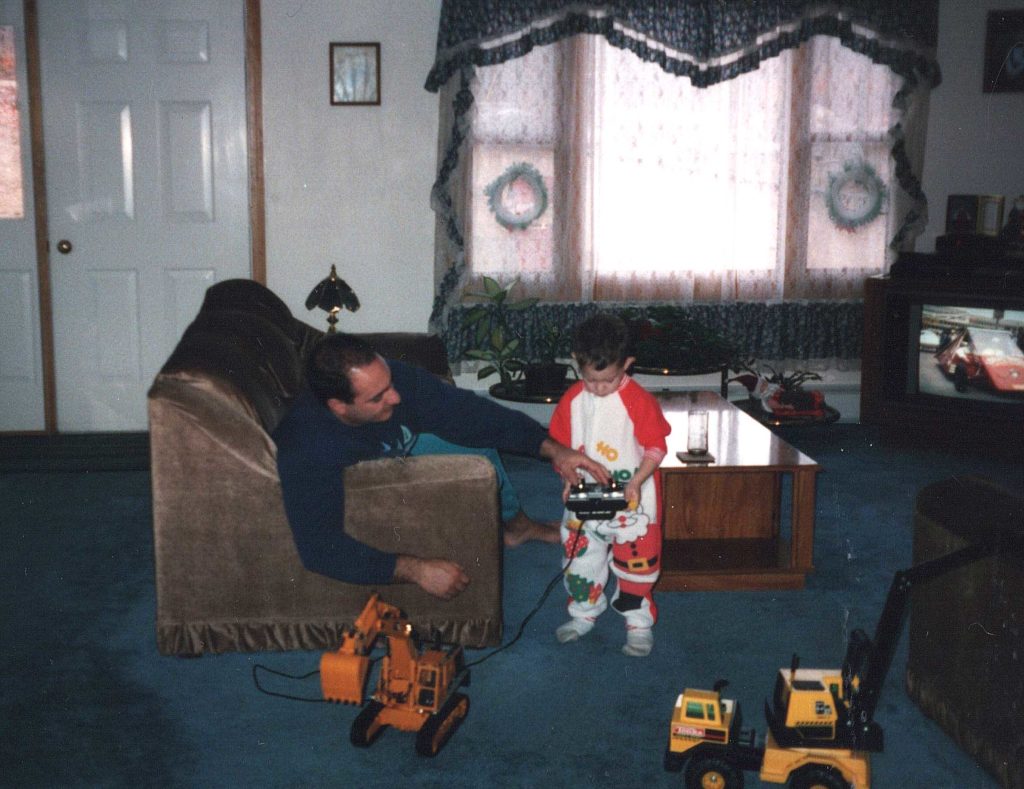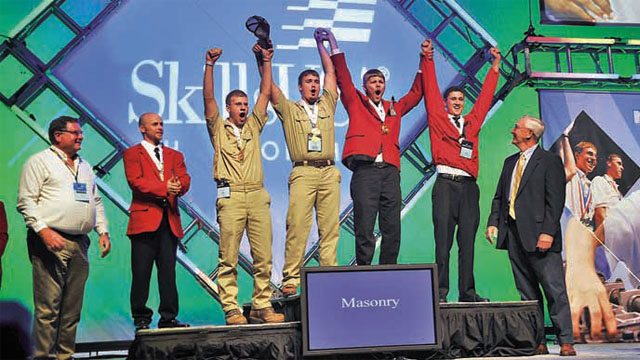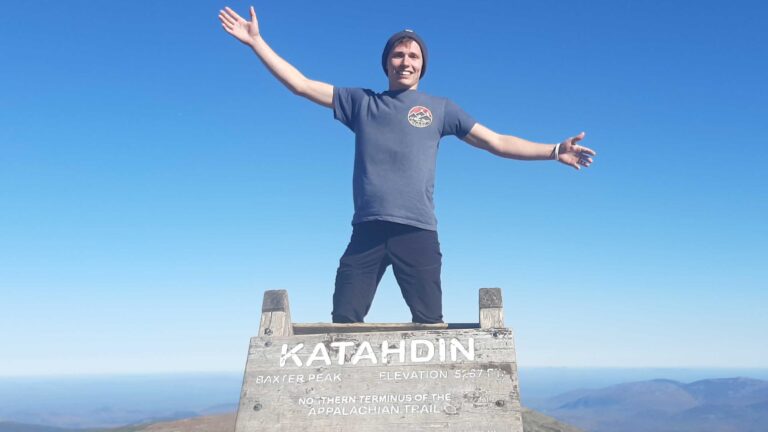DiBara (far right) onstage with the other 2010 Masonry competition national medalists. Photo by Lloyd Wolf.
“My dad was my superhero growing up,” Matt DiBara says. “He would come home and show me all the cool things he was building. I thought it was super cool.”
DiBara’s father Matthew represents the third generation of DiBara Enterprises, a Massachusetts-based construction company specializing in masonry work. Today, Matt DiBara is evolving the family legacy with DiBara Masonry, headquartered in California. At only 30, he’s achieved levels of success most would deem remarkable for someone of retirement age: He became a millionaire at 27, works on celebrity homes in L.A., is in the early stages of developing a potential TV show, writes books and curriculum, serves as a keynote speaker … achievements and opportunities born from a lifelong passion for a skilled trade that some actually discouraged him from pursuing.
Ultimately, DiBara paved his own path.
“Everything I’ve wanted, I’ve been able to set up,” he says. “I love what I do, I have a beautiful family … and SkillsUSA was definitely the root of all this.”
Sorting Stones
The roots of the family business can be traced back to DiBara’s great grandfathers: Matteo (a.k.a. “Matty the Mole”) and Michael. Both came to the U.S. from Italy in the early 1900s. “They bought some land and built their homes from the ground up,” DiBara explains. “They were artisans. And that was really the start of our business, because neighbors would ask for their help after seeing what they could do and what they built.”
As for that “Matty the Mole” nickname? “He was obsessed with digging holes,” DiBara laughs. “He found it therapeutic to dig holes in the backyard and separate the rocks. And then he would build stuff.”
“Everyone in my family took great pride in their work,” DiBara continues, “and that was one of the most important things I learned at a young age. It wasn’t an association with money, but with pride.” That pride was ignited in young DiBara when he became aware of his father’s relentless work ethic. “My dad had a master’s degree in criminal justice. He’d run the business from 6 a.m. to 4 p.m., and then he was a cop from four to midnight. He slept four hours a night for 25 years. My dad is an interesting human being.”



Eager to spend more time with his dad while making his own mark on the family legacy, DiBara frequently asked when he could join his father on a job site. His chance finally came at age 9, though not quite in the way he’d imagined.
“Yeah, fourth grade summer,” DiBara recalls. “My dad woke me up, and I got my work boots on. We get there early, and there are stones everywhere, electricians, carpenters, people mixing concrete … I was like, ‘Wow, what job am I going to do?’”
That’s when the metaphorical baton was passed from father to son [cue dramatic music] in the form of … a trash bag?
“He told me to clean up the trash from every trade area on the site,” DiBara laughs. “Looking back, I’m sure he told everyone to leave the job site messier than usual, because our sites were always clean, and I’ve never seen a job site as messy as the one on my first day.”
Trash duty didn’t last long. Soon, DiBara was sorting stones for the other masons. By 11, he was starting to lay brick, and by the time he was a teenager, he was working with architects and practically running job sites.
The entry into the teenage years coincided with an unwelcome epiphany for DiBara, something he’d never been aware of before: His dad was often “dirtier” than other dads … and people noticed. “We’d go to the grocery store or to restaurants after a job, and people would be looking at us,” DiBara remembers. “I was starting to become aware of this negative stigma that some people had about what we did.”
That awareness grew when some discouraged DiBara from enrolling in a vocational high school as a freshman, something that originally seemed like a given. “I was intellectually and hands-on smart in middle school,” DiBara says, “so a lot of people were saying, ‘You’re going to a vocational school?’ They thought I would be going into advanced placement courses in a traditional high school.”
As DiBara considered his options, the rising tide of doubt was turned when he discovered Mike Rowe’s “Dirty Jobs” TV show, a program that highlighted the dignity and value of skilled trades careers. It was his superhero dad, however, who cemented the decision. “He told me to be true to myself,” DiBara recalls. “He said if I wanted to be in this business, I should not just learn the ‘how’ but the ‘why.’ I should want to be the best.”
Mixing the Cement
When DiBara enrolled in the new masonry program at Montachusett Regional Vocational Technical High School in Massachusetts, he also joined SkillsUSA, which was a requirement if he wanted to compete.
He wanted to compete.
As a sophomore, he earned second place in his school’s masonry competition. “My Dad was so proud,” he says. As a junior, DiBara placed second in the state, and as his senior year began, he was committed to making it to the national level at the SkillsUSA Championships, part of SkillsUSA’s annual National Leadership & Skills Conference. By that time, though, it was clear that SkillsUSA was providing DiBara with so much more than opportunities for competition.
“I learned teamwork,” he says. “I learned respect. I learned humility. The goal-setting process. External recognition from my peers. And there were dances and social events, which I always had trouble with before. It also taught me to appreciate other industries, to see that something like cutting hair or electrical work was just as beautiful or intricate as the stuff I was doing. I mean, I learned so much.”
In 2010, DiBara’s school swept the top three spots at the state competition, with DiBara finally earning gold. The win punched his ticket to the SkillsUSA Championships, where he’d now be competing against the best masonry students in the nation. His philosophy was simple: “I just wanted to give my best work, and then I’d be happy with the result.”


The result was a silver medal, and while he was initially disappointed to miss gold by a mere six points, the experience of standing on a national stage while being recognized as one of the best young masons in the United States quickly put things in perspective. In that moment, a confidence was born that’s fueled him ever since.
“We need to allow people to find what they love. We need more people pushing wind in our sails and saying, ‘You can.’ SkillsUSA was the breeding ground of ‘you can’ for me.”
Matt DiBara
Paving a New Path
After graduation, DiBara was faced with another decision: college or career? Unbeknownst to DiBara, some of his supporters had submitted his name for several scholarships. When he won, a sense of obligation tipped the scales toward college, and he enrolled in the Building and Construction Technology program at the University of Massachusetts. “It never really sat well with me,” he says of his college experience. “I was still working during the summers and way more excited to be working with my hands than being in class.”
A great example of that preference came when DiBara encountered a union crew building a wall on his campus. “I noticed they had the ashlar [finely dressed stone] pattern wrong,” DiBara says, “and I went up and told the foreman. They offered me a job.”
During his junior year, DiBara was becoming more interested in offering jobs to others. He and his dad “were starting to butt heads a little bit.” DiBara wanted to modernize the business in ways his dad wasn’t comfortable with, so, with his dad’s support, DiBara started DiBara Masonry, a company he set up and ran while still a full-time student.
“I think a lot of the confidence to do that came from SkillsUSA,” he says. “Like, ‘Set a goal, achieve it, set a goal, achieve it.’ We were doing chimneys, foundation repair, I had employees, payroll, everything. I’d be sitting in class and would get a text from someone saying, ‘Hey, we’re digging and we hit a rock,’ and I’d be like, ‘OK, send me a video.’”
A Change in the Weather
DiBara was so excited to fully commit to the next phase of his career that, true to form, he pushed himself to graduate a semester early. A friend was moving to California, and DiBara — ready for a new adventure — decided to tag along and reconstruct DiBara Masonry in a warmer climate.
“I remember packing the tool bag I’d won at nationals,” DiBara says. “My friend was asking why, and I said, ‘Don’t worry, if we run out of money, you’ll be glad I have this bag.’”
Running out of money wouldn’t be an issue. Once in California, DiBara began securing jobs. Those led to more jobs, which led to more connections. Within months, DiBara Masonry’s California operation was up and running. Today, the business is thriving. “We do residential, commercial, government work,” he says. “I have nine crews, and I’ve worked on the homes of a lot of the celebrities I used to watch on TV: athletes, actors, music artists, etc.”

The more successful DiBara’s business became, the more he wanted to give back, a calling that led him to write an entire curriculum series dedicated to helping contractors hire the right people. He’s currently turning much of his knowledge into a book, and he’s also working with an agent to create a TV show in which he hopes to star as “The Undercover Contractor.” The show would provide tips to consumers on finding the best contractors while sniffing out potential scams.
DiBara’s superhero today? Still his father, who, even with dementia, still manages to inspire. “His illness has really motivated me to do a lot of these things,” DiBara admits. That motivation also inspires a mission to win the hearts and minds of those who once tried to convince him to steer clear of his passion … those unaware of just how fulfilling and rewarding the skilled trades can be … those who may question just how far an organization like SkillsUSA can take them.
“My mission now is to promote excitement in the trades and to show what you can do in these careers,” DiBara says. “I never saw that I was just ‘laying bricks.’ I was building my life, and I think if we can get people to see that in their own lives, people can go as far as they want in these areas. I’m proof of that. We need to allow people to find what they love. We need more people pushing wind in our sails and saying, ‘You can.’ SkillsUSA was the breeding ground of ‘you can’ for me.”








